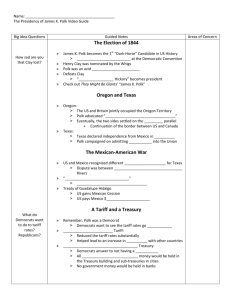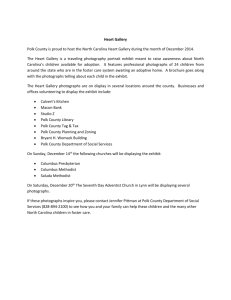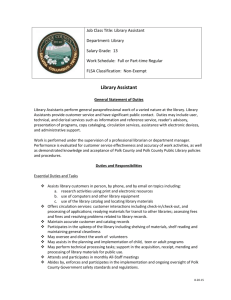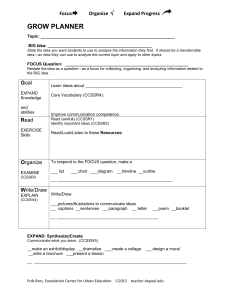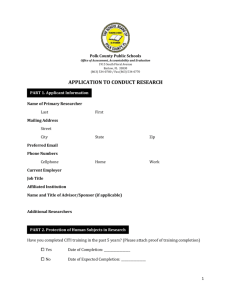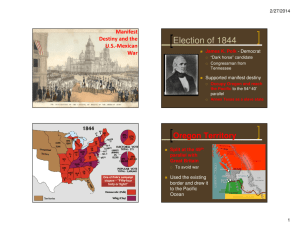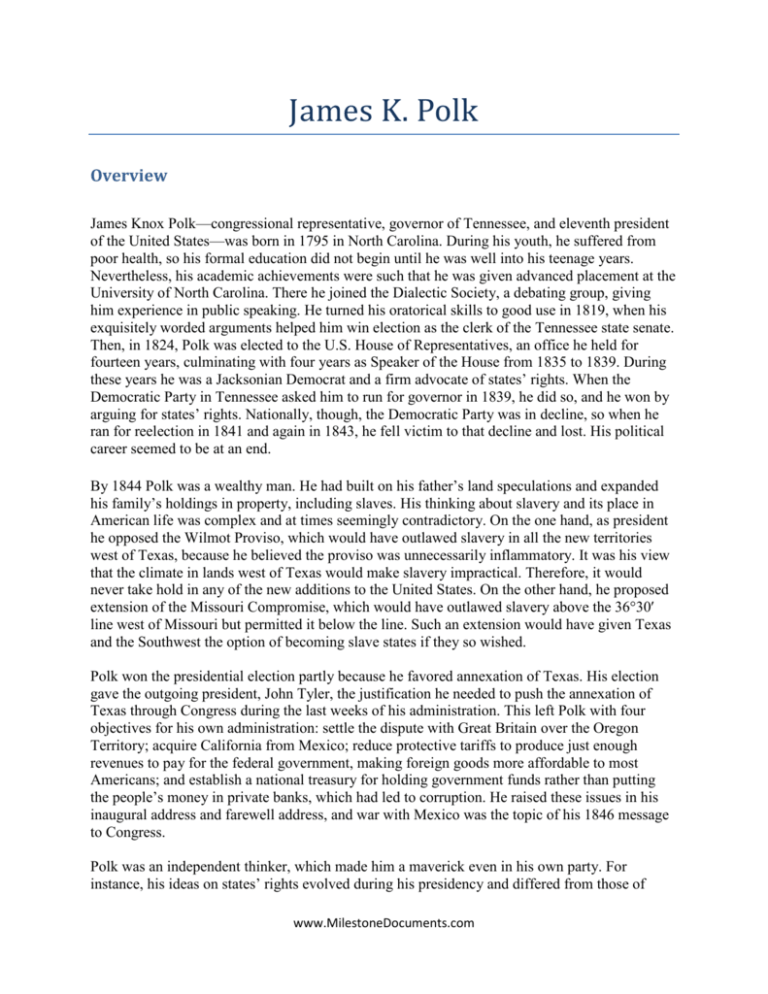
Overview
James K. Polk
James Knox Polk—congressional representative, governor of Tennessee, and eleventh president
of the United States—was born in 1795 in North Carolina. During his youth, he suffered from
poor health, so his formal education did not begin until he was well into his teenage years.
Nevertheless, his academic achievements were such that he was given advanced placement at the
University of North Carolina. There he joined the Dialectic Society, a debating group, giving
him experience in public speaking. He turned his oratorical skills to good use in 1819, when his
exquisitely worded arguments helped him win election as the clerk of the Tennessee state senate.
Then, in 1824, Polk was elected to the U.S. House of Representatives, an office he held for
fourteen years, culminating with four years as Speaker of the House from 1835 to 1839. During
these years he was a Jacksonian Democrat and a firm advocate of states’ rights. When the
Democratic Party in Tennessee asked him to run for governor in 1839, he did so, and he won by
arguing for states’ rights. Nationally, though, the Democratic Party was in decline, so when he
ran for reelection in 1841 and again in 1843, he fell victim to that decline and lost. His political
career seemed to be at an end.
By 1844 Polk was a wealthy man. He had built on his father’s land speculations and expanded
his family’s holdings in property, including slaves. His thinking about slavery and its place in
American life was complex and at times seemingly contradictory. On the one hand, as president
he opposed the Wilmot Proviso, which would have outlawed slavery in all the new territories
west of Texas, because he believed the proviso was unnecessarily inflammatory. It was his view
that the climate in lands west of Texas would make slavery impractical. Therefore, it would
never take hold in any of the new additions to the United States. On the other hand, he proposed
extension of the Missouri Compromise, which would have outlawed slavery above the 36°30′
line west of Missouri but permitted it below the line. Such an extension would have given Texas
and the Southwest the option of becoming slave states if they so wished.
Polk won the presidential election partly because he favored annexation of Texas. His election
gave the outgoing president, John Tyler, the justification he needed to push the annexation of
Texas through Congress during the last weeks of his administration. This left Polk with four
objectives for his own administration: settle the dispute with Great Britain over the Oregon
Territory; acquire California from Mexico; reduce protective tariffs to produce just enough
revenues to pay for the federal government, making foreign goods more affordable to most
Americans; and establish a national treasury for holding government funds rather than putting
the people’s money in private banks, which had led to corruption. He raised these issues in his
inaugural address and farewell address, and war with Mexico was the topic of his 1846 message
to Congress.
Polk was an independent thinker, which made him a maverick even in his own party. For
instance, his ideas on states’ rights evolved during his presidency and differed from those of
www.MilestoneDocuments.com
many other states’ rights advocates, to the point where Polk regarded states’ rights as a matter of
secondary importance. While others held that the states were the most important protectors of the
rights of minorities, Polk believed that it was the federal government—not states—that was the
protector of minority rights, even of people who were minorities within a given state.
Furthermore, many politicians in slave states, taking an extreme view of states’ rights, believed
that any state had the right to secede from the Union if its rights seemed to be denied by a
majority of other states. Polk rejected this view, believing that no state had the right to secede
once it was part of the Union. In his major writings, Polk repeatedly insisted that the federal
government represented the will of the people, even to the point of outlawing slavery. Even so,
he was a master of political compromise. His presidential documents are carefully phrased to
allow most sides of a dispute to believe their desires had been satisfied.
Polk was also a leader who knew how to maneuver other political leaders into doing what he
wanted. His 1846 message to Congress about war against Mexico and his 1848 annual message
to Congress both show how his thinking led him to the conclusion that the presidency had to be
equal in power to Congress because the president was elected by a vote of all American citizens.
Therefore, the president was the only figure who could speak to the needs and desires of all
Americans. In these documents, he shifts the balance of power between Congress and the
president, giving the president control over the military as well as the prosecution of a war and
making Congress more of an adviser to the president in military matters than the controller of
military affairs. He did this by making anyone in Congress who opposed him appear to be
unpatriotic. In the process, he advocated a view of the United States as an expansionist power
that should help the peoples of the world to become free. In Polk’s view, the United States
should be an advocate of democracy for all peoples.
Polk's Milestone Documents
In his own day, Polk was noted for his skills as a debater; his written works are usually intended
to convert his audience to his point of view. Before becoming president, he was an ardent
advocate of states’ rights and of limiting the federal government only to the powers specifically
given it by the Constitution. As president, he believed it was his duty to forsake his personal
biases and be the representative of all the American people. He expanded the powers of the
presidency, especially to wage war. In the course of his life, he developed a vision of the United
States as a place where the liberties of minorities were protected by the government, where all
disputes would be worked out according to the Constitution, and where secession of states was
impossible. He also believed that the United States was a great power with an important role to
play in international affairs.
Polk worked extremely hard on his writings, which were the result of intense research and great
care in phrasing, making him one of the most quotable politicians of his era. He created sharp,
concise phrases that summed up the points he wished to make. As a visionary, he tried to stir in
Americans a belief that the United States had a great destiny, and he was a patriot who
encouraged Americans to revere the Constitution and to reject all notions of secession by any
state.
www.MilestoneDocuments.com
Below are three milestone documents that Polk produced:
•
Polk's Inaugural Address of March 4, 1845, represents the pinnacle of his abilities; it
became a classic American document by combining unabashed patriotism with a
pragmatic statement of principles on issues of both foreign and domestic importance.
•
In his Message to Congress on War with Mexico of May 11, 1846, Polk provides a
summary of the diplomatic steps that had been taken in recent months with Mexico. He
then informs Congress about U.S. war preparations. He lays out specifics about the
boundary between Texas and Mexico, and he declares that he has given General Zachary
Taylor orders to prosecute a war if Mexico invades Texas. Perhaps the most important
aspect of Polk’s message asking Congress to declare war on Mexico is its subtle shifting
of the responsibility of making war from Congress to the president.
•
Polk's Farewell Message to Congress would today be called a State of the Union
address, but in Polk’s era, presidents did not deliver their annual message as a speech to
Congress. Instead, the message was printed and distributed to members of Congress for
them to read. Polk’s annual message to Congress of December 5, 1848—his farewell
message—is one of his most complex writings. In it, he recounts the achievements of his
administration, urges the nation and Congress not to allow the issue of slavery to divide
them, exhorts Congress not to undo his economic initiatives, and defends his use of the
veto as part of his duty to protect the American people from bad legislation.
Key Sources
The Diary of James K. Polk during His Presidency, 1845–1849, edited by Milo Milton Quaife
(1910), abridged as Polk: The Diary of a President, 1845–1849, edited by Allan Nevins (1929),
focuses on Polk’s years as president and was written by Polk for publication. The standard
edition of Polk’s letters is Correspondence of James K. Polk, 10 vols., edited by Herbert Weaver
(four volumes) and Wayne Cutler (six volumes) (1969–2004).
Adapted from Beetz, Kirk H., and Michael O'Neal, "James Polk." In Milestone Documents of
American Leaders, 4 vols., edited by Paul Finkelman. Dallas: Schlager Group, 2009. All rights
reserved.
www.MilestoneDocuments.com


